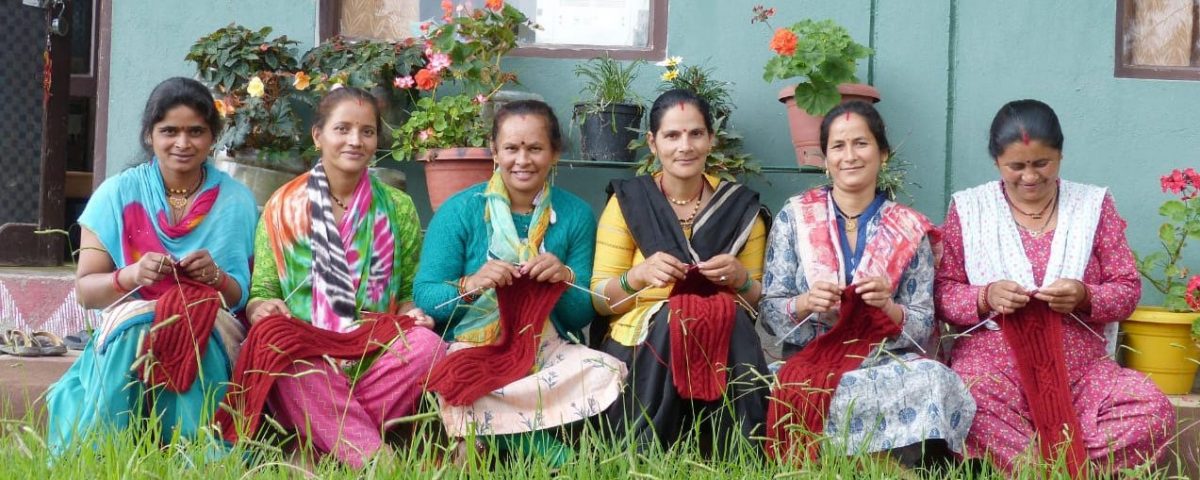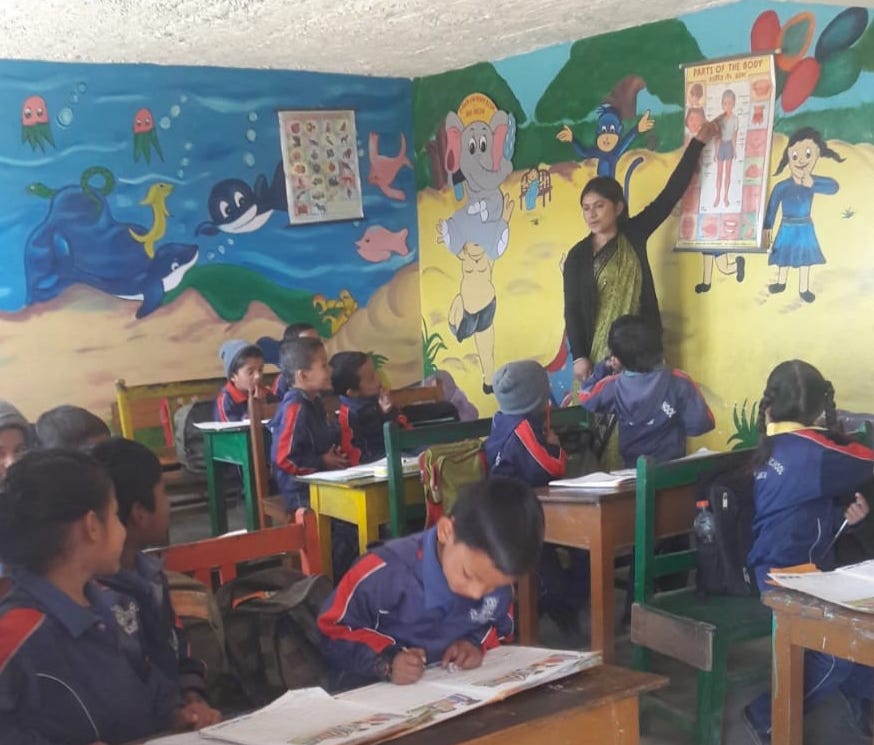
Divya Dangi : Inspiring girls to dream big
August 24, 2021
A chat with Arpita Rawat – A civil services aspirant
October 2, 2021Towards better lives and livelihoods

Prelude: The story so far…
20 years ago in the pre-internet era, very few intrepid travelers knew about Chaukori, a sleepy hamlet in the mid Himalayan ranges. The British had initiated cultivation of tea in the area before they left India for good. Except for a tea processing plant and a few buildings that housed the staff and a state-run tourist rest house, Chaukori was an example of an idyllic charm surrounded by wilderness. The magnificent snow peaks of Nandadevi and Panchachuli loomed large on the horizon. Locals stayed in houses made of stone and wood, which were few and located far from each other.
The dawn of 21 century brought the tourism industry and hotels were built in the area. Another significant development was the establishment of Himalayan Public School which focused on the educational needs of the poor children of the region. As the school’s success story spread, women began renting rooms in Chaukori so their children could get a good education. Their husband often stayed on the family farm or worked in the cities. Other families made their homes in Chaukori leaving their native villages and agricultural farms behind.
Traditionally women worked on their land and contributed to their family’s sustenance. When they moved to Chaukori, they left behind their farms and whatever meagre support they provided to the family. They had no work, no gardens, no animals and no money. Far from all their traditional supports, the women were struggling. The idea of coming together and forming a self-help group took shape. Supported by Himalayan Education Foundation (HEF) and led by Dr.Kathy Bollerud, a HEF board member, this collective was named “Himalayan Naari”.
Hand crafted Products
As the women came from traditional families in the mountains, they are gifted with knitting and weaving skills, passed on from their elders. The idea of making woolen clothes and other items and marketing and selling them in India and abroad to augment their income made sense. Various organizations and friends helped to start the business which, over years, has yielded financial benefit to the Naari members. Internationally known textile experts created designs and the members executed them, which resulted in growing business and glowing acclaim.
As the women came together and worked collectively, new ideas and initiatives emerged from interactions among themselves and with others. Providing solar lighting for knitters, establishing a nutrition program for pregnant and young mothers, training in computer and business skills, and the cultivation of organic heritage tea and vegetables etc. contributed to their self-development and confidence as women entrepreneurs. Some members have started homestay tourism ventures, where the visitors stay at their homes to get first-hand knowledge about and experience of the rich local culture and hospitality.
Apart from providing employment and generating income for the women, in what other ways has the Himalayan Naari impacted their lives, families and communities? Let’s hear from the members themselves.
Interlude: Voices…
Kusum Joshi
Kusum Joshi, a founding member of Naari, whose husband works as a hotel supervisor, says, “When I moved to Chaukori with my family, I hardly knew any other family in the neighborhood. Having come from a village, I felt a sense of isolation and loss of familiarity in the new environment. As I joined Himalayan Naari and came to know other women, I felt a spirit of bonding and belonging. We not only talk about knitting and business, but also share our personal stories. And encourage and help each other in difficult times. I found a few close friends through Naari and I am glad for that.”
”Initially I was shy and because of that I am a bit non-communicative and inhibited. After joining Naari I learnt from my seniors how to express myself clearly and they helped me overcome my fear of speaking freely in a group. Now we enjoy celebrating festivals like Holi and Uttarayani together at Naari center. We work together and play together.”
Gita Joshi
Another member Gita Joshi, a mother of two kids, remarks, “Becoming a member of Naari made me realize what teamwork can accomplish that can’t be achieved by a lone individual. It helped me to discover my potential and what I can do for the success of the group. I could learn from others and become a better contributor.”
“Working with Naari expanded my mind and my view of the world. I see many possibilities previously unknown to me. Now I know how the designers work to create new patterns and weaves, how the business takes place. The logistics are mind boggling. We could reach out to far off places and sell our products in their markets. We are now able to adapt to the tastes of our customers and are happy to see them satisfied with our products.”
Rekha Karki
Rekha Karki, a team leader and mother of four children says “My husband drives a taxi. My income from Naari augments the family income which helps in educating my children who have all passed 12th class. In our Naari meetings, we actually speak more about our personal and family matters than about work and business related issues. Like taking care of our health and hygiene, how to encourage kids to study well, how to make healthy and nutritious food etc. We also discuss what is happening in the world and what we could do to create a better society. These discussions naturally influence how I interact with my family members at home.”
“When I take a break and visit my native village, many people back home comment how much I have changed. They say I am more confident and more knowledgeable; I speak with clarity and purpose. I attribute these qualities I have gained to my association with Naari. Working as a Naari member really transformed me. It gave me skills and a sense that I too could do something and achieve useful things.”
Kiran Bhandari
Another member Kiran Bhandari, wife of a cab driver and a mother of two kids states “Pandemic made our lives hard as my husband stayed at home due to lock down restrictions and could not earn enough. Naari provided me with work and income that helped our family to overcome the difficulties and live decently. Now I realize the importance of togetherness and supporting each other.”
“We want to become more active in society and have our say in how it functions. Our voice matters too. Our participation in Naari made our children realize that empowerment of women is important for the health of the family and society we live in and gave an impression that women can also become good leaders.”
Mamata Pant
Mamta Pant is a team leader of Naari and a mother of three kids. Her husband works in a gas station. She speaks about her association with Naari, “Becoming a member of Naari made me a kind of role model among my friends and relatives in my village. They too want to start a self-help group like this and want me to lead it. I think there are still some good business ideas that need exploration. Like producing organic vegetables and grains, tea, honey and mushrooms and marketing and selling them directly to customers using internet and e-commerce facilities.”
“We would like our children to be better than us. The world has changed a lot in our own lifetime. We hope they become knowledgeable about it and the opportunities it affords. We hope they will learn skills to navigate it and prosper in this new world. Thanks to Naari, we are glad we are doing our best for our kids.”
Mamta Takuli
Mamata Takuli, the manager of the Naari activities in Chaukori, voices her thoughts: “I was a yoga teacher initially when I came to Chaukori. I did not know much about Himalayan Naari except that it provided some income for the knitters. Later I came to know what really goes on in the organization. I am amazed to find that people who are far away and who don’t know who we are personally could support and care for our well-being. The kind of efforts required and the energy that drives them are incredible. This is the larger global community that is sustaining and nurturing our local Naari community. In spite of the COVID induced lockdown, we had our work uninterrupted at Naari and the income we received helped us a lot in these hard times.”
Naari members celebrating Holi, the festival of colors
Echoing the feelings of her fellow Naari members, Mamata says, “ We are grateful to all our well-wishers and organizations who are interested in our welfare. Particularly we are thankful to Dr.Kathy and other board members of the Himalayan Education Foundation who made Himalayan Naari a reality in our lives. It’s a beautiful dream come true!”
Postlude: Lives and Livelihoods
Himalayan Naari, the women’s cooperative in Chaukori, supported by Himalayan Education Foundation (HEF), is an example of how collective action brings benefits far beyond financial freedom and economic security. Its accomplishments are mainly in building a dynamic community that promotes the spirit of empowerment through collaborative learning for personal development and social progress. It’s all about taking care of individuals in order to foster a healthier and resilient society in the Himalayan hills.
Himalayan Naari : Together we stand



